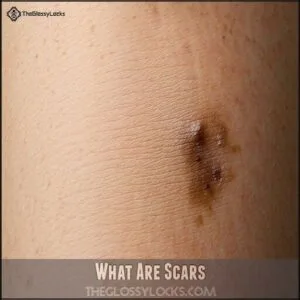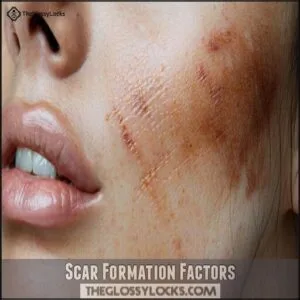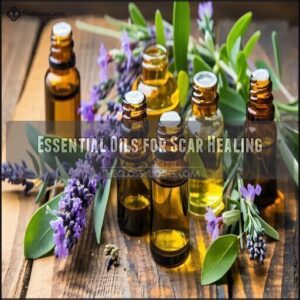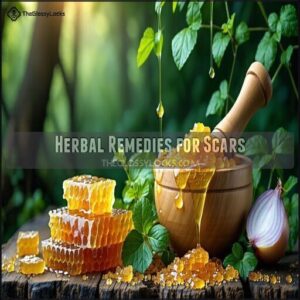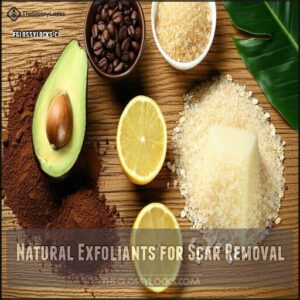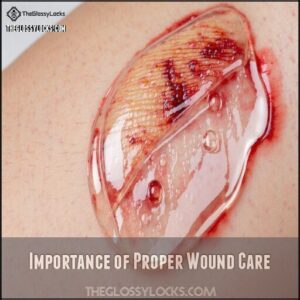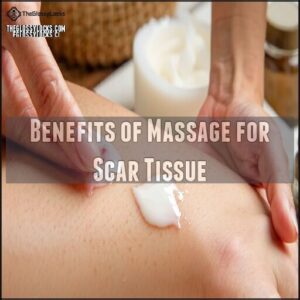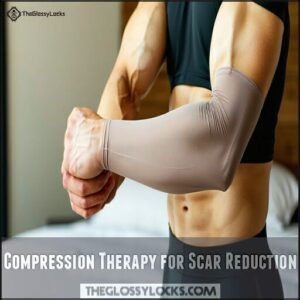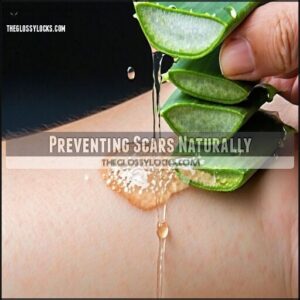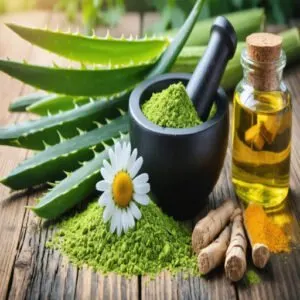This site is supported by our readers. We may earn a commission, at no cost to you, if you purchase through links.

Rosehip oil and vitamin E oil are famous for reducing scar appearance by boosting skin repair. Aloe vera gel works wonders, especially for acne scars, thanks to its soothing and regenerating properties.
Onion extract might seem unusual, but it’s scientifically shown to reduce excess collagen in scars. For a kitchen fix, try raw honey—it hydrates and promotes healing.
Don’t forget sun protection, since UV rays can darken scars. While these remedies are helpful, consistency is key.
Curious about scar minimization secrets? Stick around for more tips!
Table Of Contents
- Key Takeaways
- What Are Scars
- Scar Formation Factors
- Natural Scar Remedies
- Scar Treatment Options
- Effective Scar Healing
- Preventing Scars Naturally
- Frequently Asked Questions (FAQs)
- What are the best natural treatments for Scars?
- How to remove a scar at home?
- Which essential oils can help treat scars naturally?
- How to fade scars naturally?
- How to make a healing ointment for scars?
- Are there natural acne scar home treatments?
- What is the best natural remedy for healing scars?
- How does hydration affect scar healing?
- Can scars become painful over time?
- Are certain skin tones prone to scars?
- Conclusion
Key Takeaways
- Use natural ingredients like aloe vera, rosehip oil, and honey to hydrate skin, promote scar healing, and improve texture.
- Protect scars from UV rays with sunscreen or protective clothing to prevent darkening or worsening.
- Boost healing with proper wound care, including keeping injuries clean and moisturized while avoiding irritation.
- Maintain a nutrient-rich diet with vitamins like C and E to support collagen production and faster skin recovery.
What Are Scars
You’re looking at scars because your skin has created new collagen fibers to repair damage from injuries like cuts, burns, or acne.
Scars are your skin’s way of telling its healing story, woven with new collagen after life leaves its mark.
These patches of tissue often appear different in texture and color from your surrounding skin, making them the unwelcome souvenirs of your body’s remarkable healing process, which is a result of your skin’s ability to create new collagen fibers.
Types of Scars
Understanding your scar is the first step in treating it effectively.
You’ll encounter six main types in your skincare journey: fine line scars, keloid scars (raised bumps that grow beyond injury boundaries), hypertrophic scars (raised but contained), atrophic scars (indented from tissue loss), burn scars (varying with severity), and contracture scars (causing tightness and possible mobility issues).
Each type requires different natural remedies to address the unique characteristics of the scar, such as keloid scars.
Causes of Scars
Now that you know the different types of scars, let’s look at what causes them in the first place.
Scars develop when your dermis (the deep layer of skin) gets damaged. Your body springs into action, triggering collagen production to repair the wound.
Common culprits include acne, burns, cuts, surgeries, piercings, and even chickenpox.
Deeper burns cause scarring due to damage to the dermis.
The way your skin heals depends on the injury’s severity and your body’s unique healing response.
Scar Formation Process
Now that we’re aware of what causes scars, let’s examine how they actually form in your skin.
Your body springs into action when your dermis (the deep skin layer) gets damaged.
Here’s what happens:
- Fibroblasts rush to the wounded area and start producing collagen
- Blood clots form to close the wound
- New tissue gradually replaces damaged cells
- The scar matures over months, changing from red to pale
This process of tissue repair is like your skin’s natural construction crew at work, involving a natural construction process.
Scar Formation Factors
You’ll be surprised how your age, nutrition, stress levels, and even skin type directly influence how your scars form and heal.
Understanding these factors isn’t just fascinating science—it’s your secret weapon for preventing those stubborn marks from taking up permanent residence on your skin.
Age and Scar Formation
Now that you know what scars are, let’s look at how your age affects how your skin heals.
Your body’s repair shop works differently as you age.
| Age Group | Healing Speed | Scar Appearance |
|---|---|---|
| Children | Very Fast | Often Minimal |
| Young Adults | Fast | Usually Faint |
| Middle-Aged | Moderate | More Visible |
| Elderly | Slow | Often Prominent |
As you get older, collagen production decreases and skin elasticity diminishes.
Your youthful healing powers fade, with cellular turnover slowing down, making mature scarring more noticeable.
This process results in mature scarring being more visible over time.
Nutrition and Scar Healing
Your body needs proper fuel to heal scars effectively.
Dietary Collagen from bone broth and Protein Intake boost your skin’s repair abilities.
Hydration Effects can’t be overstated—drink plenty of water daily for ideal healing.
Anti-Inflammatory Foods like berries and leafy greens reduce redness, while zinc-rich foods support skin regeneration.
Vitamin Deficiencies, especially C and E, can substantially slow natural skin repair, so include citrus fruits and nuts in your diet.
Stress and Hormonal Balance
Your nutrition isn’t the only factor affecting scar healing—stress and hormones play a surprising role too.
When you’re stressed, cortisol levels spike, slowing down your skin’s repair process.
Those "emotional scars" can become physical ones!
Hormonal fluctuations (think puberty or pregnancy) can trigger hormonal acne that leaves lasting marks.
Try natural skincare for scars that includes stress-reducing ingredients like lavender oil, which calms both your mind and skin.
Skin Type and Scar Formation
While hormones affect your skin’s healing process, the type of skin you’re born with plays an equally important role in how scars form and heal.
Your skin type directly influences scar development, with some people more prone to certain scar types than others.
- Oily skin often develops hypertrophic or keloid scars due to excess collagen production
- Dry skin typically forms thinner, more brittle scar tissue that may crack easily
- Sensitive skin reacts more intensely to injuries, potentially worsening scar severity
- Combination skin might heal unevenly across different facial zones
- Darker skin tones are more susceptible to hyperpigmentation in scar tissue
To address this, consider implementing a consistent skincare routine.
Natural Scar Remedies
You’ll be amazed at how effectively nature’s remedies can diminish those stubborn scars without harsh chemicals or expensive treatments.
From vitamin-rich rosehip oil to anti-inflammatory aloe vera, these science-backed solutions work by supporting your skin’s natural healing process.
While you finally stop hiding behind makeup or long sleeves.
Essential Oils for Scar Healing
Several essential oils can transform your scar healing journey when applied correctly.
Tea tree and lavender oils prevent infections and promote collagen synthesis, while frankincense inhibits excessive scar tissue formation.
For best results, you’ll need to apply these oils to healing wounds rather than old scars. Many people find tea tree oil products helpful for scars.
Be patient—most oil treatments require at least 3-4 weeks of consistent use before you’ll notice improvements. Remember, helichrysum and geranium oils offer additional antimicrobial benefits for scar healing.
Herbal Remedies for Scars
While essential oils work wonders, Mother Nature offers even more healing plant compounds.
Herbal remedies have impressive natural scar removal abilities thanks to their traditional uses and unique properties.
- Gotu kola repairs connective tissue and prevents scars from expanding, making it a powerhouse for skin healing remedies.
- Onion extract gel softens scars within 4 weeks, though you might feel a brief sting at first.
- Honey creates a protective barrier with its antibacterial properties—your skin’s best friend during healing.
These herbal remedies can be used to promote skin healing and reduce the appearance of scars, making them a valuable addition to any skincare routine, with unique properties that enhance their effectiveness.
Vitamin Supplements for Scar Reduction
While herbs work wonders externally, vitamins can heal your scars from within.
Your body’s natural skin regeneration depends on specific nutrients that power collagen production and healing. Here’s what actually works for scar reduction:
Boost healing from within: vitamins like A, C, and zinc supercharge collagen production for faster, smoother skin repair.
| Vitamin | Benefits for Scar Healing |
|---|---|
| Vitamin A | Boosts white blood cells and regulates inflammation |
| Vitamin C | Enhances collagen synthesis and fights free radicals |
| Zinc | Accelerates healing and strengthens immune response |
Many turn to vitamin based products for noticeable results. You’ll notice faster results when you combine supplement timing with consistent application of skin healing remedies.
This approach can lead to faster results and a more effective healing process, ultimately supporting your body’s natural ability to heal and regenerate skin.
Natural Exfoliants for Scar Removal
Gently buffing away dead skin cells can dramatically improve scar appearance over time.
Natural exfoliants like sugar scrubs and salt exfoliation help reveal fresher skin underneath while promoting circulation. Oatmeal benefits sensitive skin with its anti-inflammatory properties, while fruit enzymes work to dissolve damaged tissue.
Coffee grounds also exfoliate and stimulate blood flow, making them excellent for natural scar removal and skin regeneration. Many people find natural scar exfoliants especially effective for improving skin health through gentle exfoliation.
Scar Treatment Options
You’ll find several effective options for treating stubborn scars that won’t empty your wallet or require a doctor’s appointment.
From medical procedures like laser therapy to simple at-home remedies, these treatment approaches can substantially reduce the appearance of scars.
While working with your body’s natural healing process, these methods can provide noticeable results, making them a viable option for those seeking to minimize the visibility of scars with simple remedies.
Medical Procedures for Scar Removal
When natural remedies aren’t enough, medical procedures step in.
Surgical excision removes tough scars, while microdermabrasion and chemical peels smooth the skin by buffing damaged layers.
Cryotherapy freezes keloids, and dermal fillers plump indented scars.
Microneedling boosts collagen, making scars less visible.
These techniques don’t just fade scars—they can feel like hitting the reset button on your skin’s texture!
Laser Therapy for Scar Reduction
Laser therapy’s a game-changer in scar treatment options, blending scar fading techniques with precision.
This non-invasive method improves scars without harming nearby skin.
Here’s how it works:
- Targets pigmentation to blend scars.
- Stimulates collagen, boosting healing.
- Requires minimal recovery time.
- Risks include redness or swelling.
- Multiple sessions may be needed.
Effective, but costs vary—worth considering the benefits!
Surgical Scar Revision
Surgical scar revision offers precise scar treatment options for postsurgical scars or stubborn marks.
Revision techniques vary but often include excision or skin grafting.
While costs and recovery expectations depend on complexity, the long-term results can be worth it.
Be mindful of revision risks, like infection or overcorrection, and consider that combined with proper scar fading techniques, it’s a reliable method for scar reduction.
Effective Scar Healing
Scar healing doesn’t need to be complicated if you know what your skin needs to recover.
By focusing on proper wound care, collagen production, and a few effective techniques like gentle massage and compression, you’ll be on your way to healthier, less noticeable scars.
This approach emphasizes the importance of understanding the skin’s recovery process and implementing effective techniques to achieve the best results.
Importance of Proper Wound Care
For scar healing, early treatment is key.
Keep the wound clean to prevent infection, and don’t skip wound hydration—it’s like giving your skin a drink.
Adequate oxygen levels speed up tissue repair, improving wound healing.
Minimize damage by handling cuts gently.
Sunscreen is essential to prevent scars from darkening.
Postwound care matters; think of it as helping your skin repair a little masterpiece.
Role of Collagen in Scar Formation
Think of collagen as the scaffold for your skin’s repair work.
When fibroblasts kickstart collagen synthesis after an injury, different collagen types come together for tissue repair.
However, excessive collagen crosslinking or degradation can lead to uneven scar tissue remodeling.
Balanced collagen production guarantees smoother healing, while overproduction creates raised scars.
It’s all about finding harmony during repair!
Benefits of Massage for Scar Tissue
Massage therapy isn’t just relaxing—it helps with scar tissue too.
Gentle, circular motions reduce pain, improve circulation, and soften tough tissue.
This boosts skin elasticity and aligns collagen fibers, making scars less noticeable.
Regular massages promote flexibility, giving your skin a smoother texture.
So, grab some lotion and try it out—your skin might thank you later for the improved skin elasticity!
Compression Therapy for Scar Reduction
Compression therapy can help flatten scars and improve their appearance.
Here’s what you need to know:
- Compression Mechanisms: It works by applying steady pressure to reduce collagen buildup.
- Garment Types: Pressure garments or compression sleeves fit snugly.
- Therapy Duration: Wear them 23 hours daily, for months.
- Pressure Levels: Aim for 20-30 mmHg.
- Scar Location: Custom garments handle tricky areas.
Preventing Scars Naturally
You can prevent scars naturally by taking care of your skin from the start, like keeping wounds clean and covered to avoid infections.
With simple steps like eating nutrient-rich foods and shielding your skin from the sun, you’ll give it the best chance to heal smoothly.
Diet and Nutrition for Healthy Skin
Healthy skin starts from the inside out.
Prioritize hydration—your skin loves water. Eat foods rich in antioxidants, like berries and spinach, to fight damage.
Address vitamin deficiencies with supplements or nutrient-packed meals. Protein sources like eggs and legumes support skin healing.
Keep your gut health strong—probiotics help! Proper skin nourishment guarantees resilience and quicker recovery for everyday skin care, ensuring healthy skin.
Lifestyle Changes for Scar Prevention
Scar prevention starts with taking care of your whole body.
Small changes make a big difference:
- Stay hydrated to boost skin repair.
- Get quality sleep; it’s your skin’s healing time.
- Quit smoking—it slows recovery.
- Limit alcohol; it dehydrates skin.
- Exercise regularly to improve circulation, helping wounds heal faster.
Avoid sun exposure for healthier, less-scarred skin, and remember that small changes make a big difference, especially when you stay hydrated.
Natural Remedies for Skin Protection
Protect your skin daily by sticking to natural remedies.
Opt for antioxidant boosts like fruits or rosehip oil, keeping your skin resilient.
Gentle cleansing prevents irritation, while proper hydration locks in healing.
Try sunscreen alternatives like zinc oxide creams and add protective clothing to block harmful elements.
These simple steps make natural skincare and home remedies manageable, using natural remedies.
Sun Protection and Scar Prevention
Don’t let UV rays worsen scar pigmentation—sun exposure can do more harm than you think.
Use broad-spectrum sunscreen types daily for sun protection. Shield fresh scars with protective clothing, like hats or sleeves.
For extra care, adopt post-sun routines like moisturizing. Consistent skincare routines are essential for healthy skin.
Scar prevention means smart skin protection, so skip baking in the sun—it’s not worth it, and remember to use broad-spectrum sunscreen and follow consistent skincare routines.
Frequently Asked Questions (FAQs)
What are the best natural treatments for Scars?
Aloe vera soothes skin and fades scars, while rosehip oil boosts healing with antioxidants.
Honey fights infections and speeds recovery.
Use diluted apple cider vinegar or shea butter for hydration, preventing scars from overstaying their welcome, with aloe vera being a key component.
How to remove a scar at home?
Rome wasn’t built in a day, and scars won’t fade overnight.
Gently massage aloe vera or rosehip oil daily, moisturize with cocoa butter, and try diluted apple cider vinegar for gradual lightening.
Patience is key!
Which essential oils can help treat scars naturally?
Tea tree, lavender, and frankincense essential oils help treat scars naturally.
They reduce inflammation, promote collagen production, and improve skin texture.
Apply a diluted mix gently—you don’t want to smell like a forest floor!
How to fade scars naturally?
To fade scars naturally, hydrate with aloe vera or rosehip oil, exfoliate gently with baking soda, and boost skin healing using vitamin C.
Also, massage scars daily with essential oils like lavender or frankincense for smoother skin.
How to make a healing ointment for scars?
Healing scars is like giving your skin a helping hand.
Mix 2 tablespoons of aloe vera, 1 teaspoon of rosehip oil, and a few drops of lavender oil—apply daily for smoother, happier skin!
Are there natural acne scar home treatments?
You can treat acne scars naturally with aloe vera for soothing, rosehip oil for healing, and diluted apple cider vinegar to fade spots.
Add gentle exfoliation using baking soda, but skip harsh scrubbing—it’s counterproductive, as it can be counterproductive!
What is the best natural remedy for healing scars?
You might think natural remedies take forever, but aloe vera gel works surprisingly fast.
It boosts collagen production, reducing scar size and improving skin texture.
Pair it with rosehip oil for extra healing power—simple, effective, and gentle.
How does hydration affect scar healing?
Keeping your skin hydrated helps scars heal better by maintaining elasticity and supporting collagen production.
Think of it like watering a plant—moisturized skin thrives, stays flexible, and reduces the chances of tight, itchy scars.
Can scars become painful over time?
Scars can become painful over time due to irritation, nerve involvement, or conditions like keloids.
It’s like that annoying tag on your shirt—small, but constant irritation keeps reminding you it’s there, which can be considered a constant irritation.
Are certain skin tones prone to scars?
Darker skin tones are more prone to raised scars, like keloids, due to a higher density of collagen-producing cells.
However, everyone can develop scars; genetics, injury type, and healing care play big roles.
Conclusion
Scar solutions can seem slippery, but sticking to simple, science-supported strategies works wonders.
From rosehip to raw honey, these effective natural skincare remedies for scars support healing and fade marks over time.
Protect scars from sunlight, stay consistent with treatments, and don’t rush—skin needs time to rebuild.
Pair remedies with proper nutrition, hydration, and care to boost results.
Remember, scars tell stories, but there’s no harm in softening the script. Your skin’s healing journey is unique—embrace it, and note that simple strategies and proper care make a difference.

